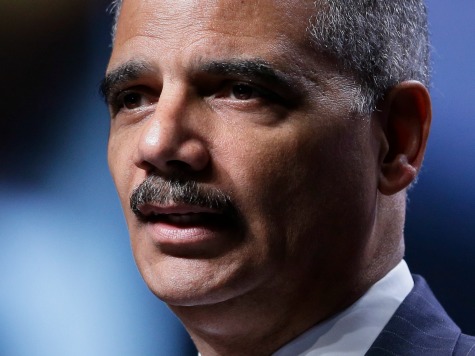Judicial Watch has finally forced the Obama Department of Justice (DOJ) to provide a detailed listing of all the records it has withheld from Congress and the American people about the deadly Operation Fast and Furious scandal and its cover-up. The documents, as we suspected, detail the personal involvement of outgoing Attorney General Eric Holder in managing the DOJ’s media strategy and its response to congressional investigations.
But what really stands out is the disturbing extent to which President Obama’s executive privilege claims regarding these records are a fraud and an abuse of his office. There is no precedent for Obama’s Nixonian assertion of executive privilege regarding these ordinary government agency records. The Obama administration is even withholding emails between Holder, his wife Sharon Malone, and his mother under absurd claims of executive privilege. Obama, personally and through his authority as President of the United States, asserts that Eric Holder’s wife and mother are entitled to know more about the Fast and Furious operation than the American people and the United States Congress.
Fast and Furious was a joint DOJ-Bureau of Alcohol, Tobacco, Firearms and Explosives gun-running operation that the administration perpetrated, expecting it would bolster gun control proposals in the U.S. The idea was to allow guns to find their way into the arms of Mexican drug cartel members who would use them in criminal operations. Some of the weapons used in Fast and Furious have been implicated in the murder of Border Patrol Agent Brian Terry and hundreds of innocent Mexicans. We have also obtained information through a lawsuit filed against the City of Phoenix, Arizona, that shows Congress has confirmed that an AK 47 rifle used in a July 29, 2013, gang-style assault on an apartment building that resulted in the wounding of two people was part of the Fast and Furious program.
A critical turning point in the growing controversy over DOJ tactics came on June 28, 2012, when Holder was held in contempt by the House of Representatives over his refusal to turn over records that explained why the Obama administration declined to reveal critical information to Congress that cut to the truth of Fast and Furious. The timeline of events says much about the administration’s ongoing efforts to withhold information. Just a week before the contempt finding, President Obama asserted executive privilege over Fast and Furious records the House Oversight Committee had subpoenaed eight months earlier. This was a not-too-subtle effort to protect Holder from criminal prosecution and pre-empt the contempt vote. We filed our Freedom of Information Act request seeking these Fast and Furious records just two days after Obama made his assertion of executive privilege. After the DOJ predictably denied our FOIA request, we filed a FOIA lawsuit on September 12, 2012.
But then the Justice Department convinced U.S. District Court Judge John D. Bates to stay our lawsuit, in part to allow ongoing settlement discussions between the Holder’s government lawyers and the House Committee to continue. Unsurprisingly, the “negotiations” between politicians running the House and the Justice Department went nowhere.
A major breakthrough came on July 18, 2014, when Judge Bates lifted what had been a 16-month delay of our open records lawsuit. Most significantly, he ordered the production of a Vaughn Index by October 1. On September 23, Bates denied the DOJ’s request that it be given over an extra month – until November 3 to produce a Vaughn Index. Holder announced his decision to resign just two days after this court ruling denying the DOJ’s request for an extension. We do not view this as a coincidence.
A Vaughn Index can be enormously helpful to the cause of openness and transparency in FOIA litigation, as it must typically (1) identify each record withheld; (2) state the statutory exemption claimed; and (3) explain how disclosure would damage the interests protected by the claimed exemption. The 1,307-page draft Vaughn index, which explains 15,662 documents, arguably fails to provide all this required information, but is highly revealing.
Our initial review of this material reveals:
- Numerous emails that detail Attorney General Holder’s direct involvement in crafting talking points, timing public disclosures, and handling ongressional inquiries in the Fast and Furious matter.
- President Obama has asserted executive privilege over nearly 20 email communications between Holder and his spouse Sharon Malone. The administration also claims that the records are also subject to withholding under the “deliberative process” exemption. This exemption ordinarily exempts from public disclosure records that could chill internal government deliberations.
- Numerous entries detail the DOJ’s communications (including those of Eric Holder) concerning the White House about Fast and Furious.
- The scandal required the attention of virtually every top official of the DOJ and the Bureau of Alcohol, Tobacco and Firearms (ATF). Communications to and from the United States Ambassador to Mexico about the Fast and Furious matter are also described.
The continued fallout from Fast and Furious to the American people is difficult to overstate. The guns from the scandal are expected to be used in criminal activity on both sides of the U.S.-Mexican border for years to come.
Judicial Watch again has proven itself more effective than Congress and the establishment media in providing basic oversight of this out-of-control administration. This Fast and Furious document provides dozens of leads for further congressional, media, and even criminal investigations. Hopefully, they will follow JW’s lead.

COMMENTS
Please let us know if you're having issues with commenting.